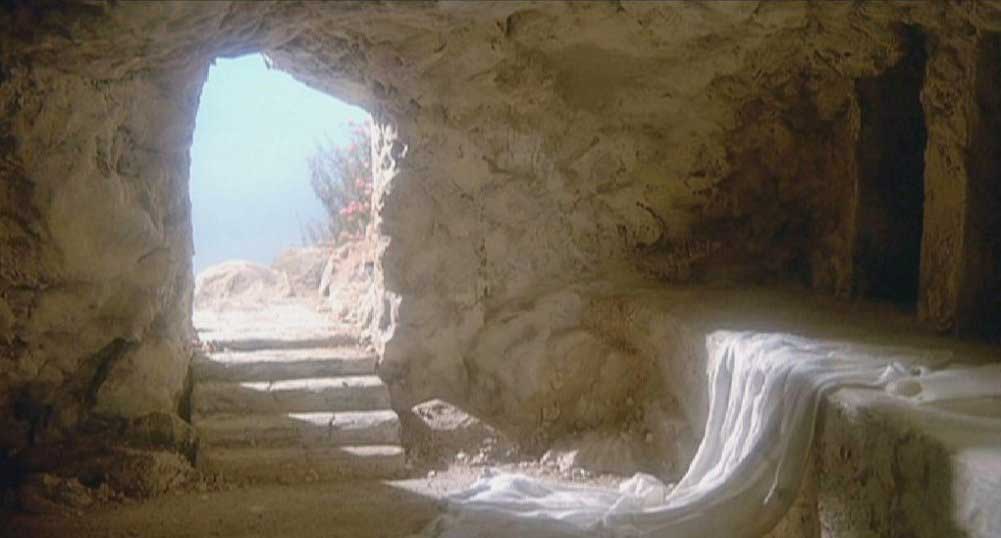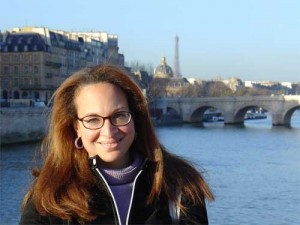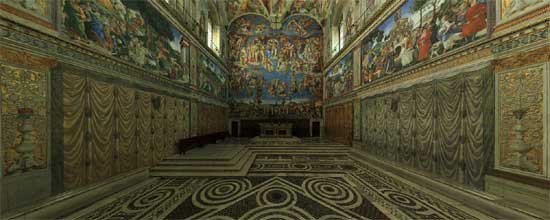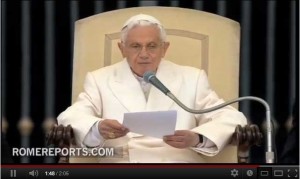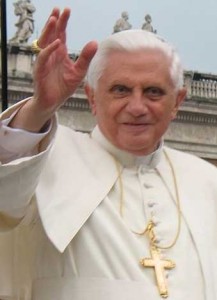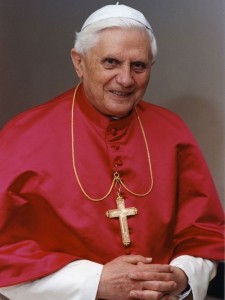[powerpress]
(Vatican Radio) Have you ever read anything Saint Thérèse of Lisieux wrote? If you have or even if you haven’t be sure to
listen to this programme focusing on the writings of this Doctor of the Church to mark the day the Church remembers her on October 1st.
Saint Thérèse was a Carmelite nun who died of tubercolosis in 1897 at the age of 24. Pope Pius XI who canonised her declared that the life she lived in Carmel did not go beyond the common order of things. However she sublimated that life to such an extent that she was proposed by four popes in succession as an example to follow.
She left us her autobiography, by the title: ” The Story of a Soul” . It became a best seller and is considered one of the greatest books of spirituality ever written.
In this programme written and presented by Jill Bevilacqua and produced by Sean Patrick Lovett we bring you a selection of readings from this book.
For a PDF download from Discerning Hearts of  St. Therese’s “The Story of a Soul“…click here
Tags: Discerning Hearts, PDF, Saint Th, St. therese little flower, st. therese of lieseux, vatican radio
This entry was posted on Tuesday, October 1st, 2013 at 7:30 am
You can follow any responses to this entry through the RSS 2.0 feed.
(Vatican Radio)
Listen: [powerpress]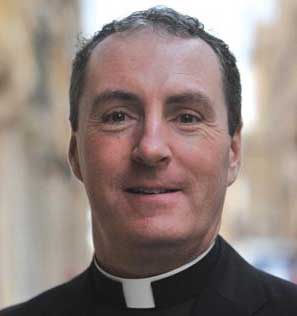
How does God measure success? What is a good measure of success? How do we know what tasks God wants us to fulfill? Is it wrong to be rich?
These are just some of the questions sent in by listeners that our very own official from the Vatican’s Congregation for the Doctrine of the Faith, Msgr. John Kennedy , answers in this week’s episode of Questions of Faith, as he helps us to navigate the modern world and rediscover what we believe and why we believe.Â
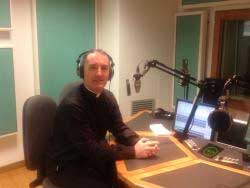
Tags: vatican radio
This entry was posted on Tuesday, June 25th, 2013 at 5:55 am
You can follow any responses to this entry through the RSS 2.0 feed.
[powerpress]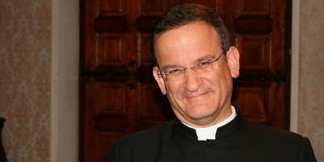
From Vatican Radio –
The pierced and bloodied body of Christ has been taken down from the cross and laid to rest in the tomb of Joseph of Arimathea, the great rock rolled over its entrance and all is silent..
On Holy Saturday, as we prepare to celebrate the great mystery of the Lord’s Resurrection on Easter Sunday, we are given a gift: a time for silent reflection and prayer, a moment to ask forgiveness and to hope in the joy that only Christ can bring.To help us enter into the proper spirit of the day, we go to Jerusalem, the city of Our Lord’s Passion, death and Resurrection. From there, Jesuit Fr. David Neuhaus, Patriarchal Vicar for the Hebrew speaking Catholic community, joins us to offer this reflection…
Tags: death, holy saturday, Jesuit Fr, reflection
This entry was posted on Saturday, March 30th, 2013 at 9:39 am
You can follow any responses to this entry through the RSS 2.0 feed.
[powerpress]
From Vatican Radio: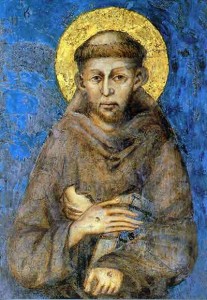
The 265th Successor of Peter has taken the name Francis. He hasn’t yet told us why but one presumes it’s after Saint Francis who was born in Assisi, an Umbrian hilltop town in 1181.
Saint Francis is “the one saint whom all generations have succeeded in canonising” and is probably the best known saint in the whole calendar.
The 19th century French Protestant writer Ernest Renan , declared that ” after Jesus, he was the only perfect Christian . Blessed ” Pope Pius IX , in an encyclical celebrating the 7th centenary of the death of Saint Francis said the same.
“Whether or not Francis was the one and only perfect Christian ” comments biographer Abbé Englebert, “he was certainly the only Christian to take Christ quite literally at his word. Noone else has ever dared to do so .”
Perhaps Thomas Merton comes closest to the truth when he says: ” merely to know Saint Francis is to understand the Gospel in all its fullnes.”
What we know is that Francis was praying one day in the little ruined chapel of San Damiano. Suddenly the figure of Christ on the Crucifix called out to him…”Francis, go and repair my house, which as you see is falling into ruin.”…..
Tags: French Protestant, Saint Francis, san damiano, st francis of assisi, vatican radio
This entry was posted on Saturday, March 16th, 2013 at 4:10 am
You can follow any responses to this entry through the RSS 2.0 feed.
In part three of our series answering listener’s questions of faith, Monsignor John Kennedy, an official at the Congregation for the Doctrine of the Faith, answers a question from a listener in Korea who has asked how often we should go to Confession. In this weeks episode, Monsignor Kennedy brings us on a journey of rediscovery of the Sacrament of Reconciliation.
Listen: [powerpress]
Tags: faith, Korea, Monsignor John Kennedy, Monsignor Kennedy, vatican radio
This entry was posted on Wednesday, December 19th, 2012 at 5:50 am
You can follow any responses to this entry through the RSS 2.0 feed.
In part two of our series answering listeners questions of faith, Monsignor John Kennedy, an official at the Congregation for the Doctrine of the Faith, answers a question from the USA on the pace we should apply to reading the Catechism of the Catholic Church; from the UK on why we are baptised as infants and not later on in life; and reveals a little known fact regarding who can minister the Sacrament of Baptism
Listen: [powerpress]
Tags: baptism, Monsignor John Kennedy, UK, vatican radio
This entry was posted on Thursday, December 13th, 2012 at 7:17 am
You can follow any responses to this entry through the RSS 2.0 feed.
In Vatican Radio’s new series “Questions of Faithâ€, accompanying Pope Benedict XVI’s catechesis on the Year of Faith, Monsignor John Kennedy an Official at the Congregation for the Doctrine of Faith will be on hand to answer listener’s questions on everything from why we are baptised as infants to why priests don’t get married.
This week the focus is on formation, starting with the Catechism of the Catholic Church. “Good Catechesis is essential for the New Evangelization†reads proposal 29 of the recent Synod of Bishops on the New Evangelisation. In their list submitted to Pope Benedict XVI, the bishops from across the globe all concurred that attention must be drawn to “the indispensable service that catechists provide†and renewed emphasis on the “Catechism of the Catholic Church†and its Compendium as a resource for teaching the faith and supporting adults in the Church in their evangelizing and catechizing mission.
Mons. Kennedy starts at the very beginning: what is the Catechism? Where does it come from? How do we use it?
Listen: [powerpress]
In next week’s episode, we will be answering questions from Vatican Radio listeners from Korea, the USA and the United Kingdom, from why we pray to Saints to how often we should go to Confession.
So if you have any questions, big or small, why not ask the official? You can do this by submitting them to Vatican Radio’s – English Section Facebook page as a post or private message and tuning in each Tuesday to find out the answers to your Questions of Faith.
Tags: catechism of the catholic church, faith
This entry was posted on Wednesday, November 14th, 2012 at 12:13 pm
You can follow any responses to this entry through the RSS 2.0 feed.
(Vati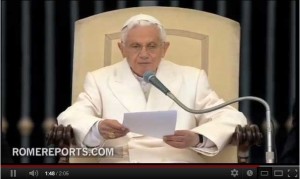 can Radio) What really satisfies man’s deepest desire? Is the desire for God absurd, irrational in today’s secularised world? How do we reach out to people who have lost their faith? To people who do not believe in God? How do we accompany them on their search for true good? These were the questions Pope Benedict XVI posed to 30 thousand people in St Peter’s Square for the Wednesday general audience, the third in his series for the Year of Faith.
can Radio) What really satisfies man’s deepest desire? Is the desire for God absurd, irrational in today’s secularised world? How do we reach out to people who have lost their faith? To people who do not believe in God? How do we accompany them on their search for true good? These were the questions Pope Benedict XVI posed to 30 thousand people in St Peter’s Square for the Wednesday general audience, the third in his series for the Year of Faith.
Listen:[powerpress]
The answer, Pope Benedict XVI said, lies in rediscovering the real meaning of human desire, ecstasy and love. In rediscovering our taste for the joys of life.
“We must believe that even in our era, seemingly reluctant to the transcendent dimension, that it is possible to open a path toward an authentic religious meaning of life, showing how the gift of faith is not absurd, it is not irrationalâ€
Below please find a Vatican Radio translation of Pope Benedict XVI’s general Audience catechesis, the third in his series on the Year of Faith:
Dear brothers and sisters,
The journey of reflection that we are making together this Year of Faith leads us to meditate today on a fascinating aspect of the Human and Christian experience: man carries within himself a mysterious desire for God. In a very significant way, the Catechism of the Catholic Church opens with the following consideration: “The desire for God is written in the human heart, because man is created by God and for God; and God never ceases to draw man to himself. Only in God will he find the truth and happiness he never stops searching for”(No. 27).
Such a statement, which even today in many cultural contexts seems quite acceptable, almost obvious, might instead appear as a provocation in the sphere of secularized Western culture. Many of our contemporaries could, in fact, argue that they do not feel such a desire for God at all. For large sectors of society He is no longer desired, expected, but rather a reality that leaves some indifferent and not even worth wasting one’s breath over. Actually, what we have defined as “desire for God†has not completely disappeared and still today, in many ways, appears in the heart of man. Human desire always tends towards certain tangible assets, which are often far from spiritual, and yet it is still faced with the question of what “the†good really is and as a result confront itself with something other than itself, something that man cannot create, but is called upon to recognize. What can really satisfy man’s desire?In my first encyclical, Deus caritas est, I tried to analyze how such dynamism is experienced in human love, an experience which in our era is more easily perceived as a moment of ecstasy, of going beyond oneself, as a place where man senses that he is being filled with a desire that is beyond him. Through love, men and women experience in a new way, thanks to one another, the grandeur and beauty of life and of reality. If what I experience is not a mere illusion, if I really want the good of the other as a path towards my own good, then I must be willing to de-centralize myself, to put myself at the service of the other to the point of surrendering myself. The answer to the question about the meaning of the experience of love thus passes through the cleansing and healing of the will, which is required by the very good we want for the other. We have to practise, train and even correct ourselves so that that good may be truly wanted. (more…)
Tags: pope benedict xvi, year of faith
This entry was posted on Wednesday, November 7th, 2012 at 2:17 pm
You can follow any responses to this entry through the RSS 2.0 feed.
From Vatican Radio:
It’s been 500 years since Michelangelo completed work on the celebrated frescos that adorn the ceiling of the Sistine Chapel. On the Eve of the feast of All Saints, the reigning pontiff, Pope Julius II, solemnly dedicated the monumental work.
Earlier this week, Pope Benedict XVI, following in the footsteps of his predecessor, celebrated Vespers in the Chapel to commemorate the occasion.
Vatican Radio’s Christopher Wells spoke with art historian and tour guide Dr. Elizabeth Lev about the significance of Michelangelo’s work. “In a world where people are always looking forward to the next new thing, and the next hot thing, and the next novelty, that there is still a place where people look backwards and they look in awe at a tradition and a manifestation of what is clearly faith and art, is really quite an amazing thing.â€
Dr. Lev speaks about the central focus of the ceiling, and its relevance for people today. “Michelangelo . . . reduced the story to the human figure. And you see God as an actor, God moving, God interested in that which He creates. He’s physically engaged in the act of creation. I think to begin with, to see a God that wants to be involved is already unbelievably hopeful to people.â€
The Sistine Chapel, she says, speaks to all people: “And then we see the centrality of the creation of man, and how important man is, and that, no matter who you are or where you come from, you can see yourself reflected in that ceiling . . . An innumerable number of people can look in that ceiling and see themselves reflected, and see themselves reflected as beautiful, as heroic, as extraordinary – which is what human beings are. And that makes the Sistine Chapel universal. But of course ‘universal,’ I believe, is the definition of Catholic . . .â€
Listen to the complete interview of Dr. Elizabeth Lev with Christopher Wells: [powerpress]
Tags: art, beauty, sistine chapel
This entry was posted on Tuesday, November 6th, 2012 at 4:21 am
You can follow any responses to this entry through the RSS 2.0 feed.
From Vatican Radio:
[powerpress]
“In a world where individualism seems to regulate relationships between people, rendering them increasingly fragile, faith calls us to be people of God, to be Church, and bearers of God’s love and communion for all mankind”, said Pope Benedict XVI Wednesday as he continued his general audience catechesis on the ‘Act of Faith’, more familiarly known as the ‘Creed’. Emer McCarthy reports:
Despite foreboding skies and sharp temperatures, the audience was held in St Peter’s square. In off the cuff comments to the thousands who withstood the drizzle huddled under umbrellas to hear the Pope’s words, Benedict XVI noted ‘it could be worse’.
Last week the Pope had spoken of how we have seen that faith is something intensely personal: a gift of God which transforms and enriches our life. But, he asked this Wednesday: “If faith is of a purely personal, individual character? Does it only affect me personally? Do I live my faith alone?â€
In comments in Italian Benedict XVI said : “The answer is found in Baptism, when the priest asks the person to be baptized if he believes in God the Father, Jesus His only Son and the Holy Spirit. The “I do” with which we answer “is not the result of my solitary reflection, it is not the product of my own thoughts, but it is the result of a relationship, a dialogue in which there is a listening, and receiving and response; it is communicating with Jesus that takes me out of the “I” that is enclosed in on myself to open up to the love of God the Father. It is like a rebirth in which I find myself united not only Jesus, but also all those who have walked and walk on the same path; and this new birth, which begins with Baptism, continues throughout the course of my existence. I can not build my personal faith in a private dialogue with Jesus, because faith is given to me by God through a community of believers, the Church, and I a become part of the multitude of believers in a community that is not only sociological, but rooted in the eternal love of God. ”
Tags: nicene creed, pope benedict xvi, year of faith
This entry was posted on Wednesday, October 31st, 2012 at 5:15 am
You can follow any responses to this entry through the RSS 2.0 feed.
(Vatican Radio) On Wednesday Pope Benedict XVI began the second installment in his general audience catechesis on faith, by putting a series of questions to the thousands of pilgrims and visitors to St Peter’s Square. He asked them: What is faith? Does faith still make sense in a world where science and technology have opened new horizons that were, until recently, unthinkable? What does it mean to believe today? Emer McCarthy reports
[powerpress]
These “unrelenting†questions, he told them, are typical of the world today of “a certain kind of culture, has educated us to move only within the horizon of things, of the feasible, to believe only what we can see and touch with our hands. On the other hand, the number of people who feel disoriented is growing and, in seeking to go beyond a purely horizontal reality, they are willing to believe anything and its direct oppositeâ€.
But, added the Pope, these questions also reveal that despite the “greatness†of our human discoveries, we need and want more than the simply tangible. We need and are looking for “love, meaning and hope, a sure foundation, a solid ground to help us live with an authentic sense even moments of crisis, darkness, difficulties and daily problems. Faith gives us just that: it is a confident trust in a “You”, that is Godâ€.
Below a Vatican Radio translation of the Holy Father’s general audience catechesis:
Dear Brothers and Sisters,
last Wednesday with the start of the Year of Faith, I began a new series of catechesis on faith. Today I would like to reflect with you on an elementary question: What is faith? Does faith still make sense in a world where science and technology have opened new horizons that were, until recently, unthinkable? What does it mean to believe today? In fact, in our time what we need is a renewed faith education, which includes a certain awareness of its truth and the events of salvation, but that mainly arises from a real encounter with God in Jesus Christ, from loving Him, trusting him, so that our entire life is involved.Today, along with many signs of good, a sort of spiritual desert is growing around us. Sometimes, the events we hear about in the news every day, give us the feeling that the world is not projected toward building a more fraternal and peaceful community; the very ideas of progress and well-being show their darker shadows. Despite the greatness of the discoveries of science and the breakthroughs of technology, today man does not seem to have truly become freer, more humane; there are still many forms of exploitation, manipulation, violence, oppression, injustice … Moreover a certain kind of culture, has educated us to move only within the horizon of things, of the feasible, to believe only what we can see and touch with our hands. On the other hand, the number of people who feel disoriented is growing and, in seeking to go beyond a purely horizontal reality, they are willing to believe anything and its direct opposite. In this context, some fundamental questions emerge, which are much more concrete than they appear at first sight: What is the meaning of life? Is there a future for the man, for us and for future generations? Where should we direct the choices of our freedom for a successful and happy life? What awaits us beyond the threshold of death? (more…)
Tags: pope benedict xvi, year of faith
This entry was posted on Wednesday, October 24th, 2012 at 9:40 am
You can follow any responses to this entry through the RSS 2.0 feed.
[powerpress]
Below a Vatican Radio translation of the Holy Father’s catechesis from original text in Italian.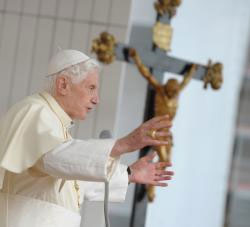
Dear Brothers and Sisters,
In the last catechesis I began speaking about one of the privileged sources of Christian prayer: the sacred liturgy, which – as the Catechism of the Catholic Church affirms – is “participation in Christ’s own prayer addressed to the Father in the Holy Spirit†(Catechism of the Catholic Church, 1073). In the liturgy, all Christian prayer finds its source and goal.”(n. 1073). Today I would like us to ask ourselves: in my life, do I reserve enough space for prayer and, above all, what place does liturgical prayer have in my relationship with God, especially the Mass, as participation in the common prayer of the Body of Christ which is the Church ?In answering this question we must first remember that prayer is the living relationship of the children of God with their Father who is good beyond measure, with his Son Jesus Christ, and the Holy Spirit (cf. ibid., 2565). Therefore, the life of prayer lies in habitually being in the presence of God and being conscious of it, in living our relationship with God just as we live the usual relationships of our lives, those with close family members, and with real friends; indeed our relationship with the Lord gives light to all of our other relationships. This communion of life with God, One and Triune, is possible because, through Baptism we have been inserted into Christ, we have begun to be one with Him (cf. Rom 6:5).
In fact, only in Christ we can talk to God the Father as children, otherwise it is not possible, but in communion with the Son, we too can say, as he said “Abba”, because only in communion with Christ, can we know God as our true Father (cf. Mt 11:27). For this Christian prayer lies in constantly looking, in an ever new way, at Christ, talking with Him, being in silence with Him, listening to Him, acting and suffering with Him. The Christian rediscovers his true identity in Christ, “the firstborn of every creature », in whom all things were created (cf. Col 1:15 ff). By identifying with Him, being one with Him, I discover my personal identity, that of the true child who sees God as a Father full of love.
But do not forget: we discover Christ, we know him as a living Person, in the Church. It is “his Body.” This embodiment can be understood from the biblical words on man and woman: the two shall become one flesh (cf. Gen 2:24, Ephesians 5.30 ff. 1 Cor 6.16 s). The unbreakable bond between Christ and the Church, through the unifying power of love, does not negate the ‘you’ or ‘I’, but raises them to their most profound unity. Finding one’s true identity in Christ means achieving communion with him, that does not cancel me out, but raises me to the highest dignity, that of a child of God in Christ, “the love-story between God and man consists in the very fact that this communion of will increases in a communion of thought and sentiment, and thus our will and God’s will increasingly coincide “(Encyclical Deus Caritas Est, 17). To pray means to rising towards the heights of God through a necessary gradual transformation of our being.
Thus, participating in the liturgy, we make ours the language of the Mother Church, we learn to speak it and for it. Of course, as I have already said, this takes place in a gradual manner, little by little. I have to progressively immerge myself in the words of the Church, with my prayer, my life, my suffering, my joy, my thoughts. It is a journey that transforms us.
This entry was posted on Thursday, October 4th, 2012 at 6:11 am
You can follow any responses to this entry through the RSS 2.0 feed.
[powerpress = “Vatican_Radio”]
VATICAN CITY, SEPT. 12, 2012 (Zenit.org).- Here is a translation of the address Benedict XVI gave today in Paul VI Hall at the general audience. The Holy Father today continued his reflection on prayer in the book of Revelation.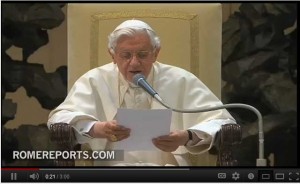
* * *
Dear brothers and sisters,
Last Wednesday I spoke about prayer in the first part of Revelation. Today we move on to the second part of the book; and whereas in the first part, prayer is oriented toward the Church’s inner life, in the second, attention is given to the entire world; the Church, in fact, journeys through history; she is part of it, in accordance with God’s plan.
The assembly that listened to John’s message presented by the reader rediscovered its duty to cooperate in the expansion of the Kingdom of God, as “priests of God and of Christ” (Revelation 20:6; cf. 1:5; 5:10) and it opens out to the world of men. And here, in the dialectical relationship that exists between them, two ways of living emerge: the first we may define as the “system of Christ,” to which the assembly is happy to belong; and the second, the “worldly systems opposed to the kingdom and the covenant and activated through the influence of the Evil One,” who by deceiving men wills to establish a world opposed to the one willed by Christ and by God (cf. Pontifical Biblical Commission, The Bible and Morality, Biblical Roots of Christian Conduct, 70).
The assembly must therefore know how to interpret in depth the history it is living, by learning to discern events with faith in order to cooperate by its action in the growth of the Kingdom of God. And this work of interpretation and discernment, as well as action, is linked to prayer.
First, after the insistent appeal of Christ, who in the first part of Revelation said seven times: “He who has an ear, let him hear what the Spirit says to the Church” (cf. Revelation 2:7,11,17,29; 3:6,13,22), the assembly is invited to ascend to Heaven, to look upon reality through God’s eyes; and here we discover three symbols, reference points from which we may begin to interpret history: the throne of God, the Lamb and the book (cf. Revelation4:1 – 5:14).
The first symbol is the throne, upon which there is seated a person John does not describe, for he surpasses every human representation. He is only able to note the sense of beauty and joy he experiences in His presence. This mysterious figure is God, God Almighty who did not remain enclosed within His heaven but who drew close to man, entering into a covenant with him; God who makes his voice — symbolized by thunder and lightning — heard in history, in a mysterious but real way. There are various elements that appear around the throne of God, such as the twenty-four elders and the four living creatures that unceasingly render praise to the one Lord of history.
The first symbol, then, is the throne. The second symbol is the book, which contains the plan of God for events and for men. It is hermetically sealed with seven seals, and no one is able to read it. Faced with man’s inability to scrutinize the plan of God, John experiences a deep sadness, which causes him to weep. But there is a remedy for man’s dismay before the mystery of history: there is one who is able to open the book and shed light on it.
And here the third symbol appears: Christ, the Lamb immolated in the sacrifice of the Cross, but who stands as a sign of his Resurrection. And it is the Lamb, Christ who died and rose, who gradually opens the seals and unveils the plan of God, the deep meaning of history.
What do these symbols tell us? They remind us of the path to knowing how to interpret the facts of history and of our own lives. By raising our gaze to God’s heaven in a constant relationship with Christ, by opening our hearts and our minds to him in personal and communal prayer, we learn to see things in a new way and to grasp their truest meaning. Prayer is like an open window that allows us to keep our gaze turned toward God, not only for the purpose of reminding us of the goal toward which we are directed, but also to allow the will of God to illumine our earthly journey and to help us to live it with intensity and commitment.
How does the Lord guide the Christian community to a deeper reading of history? First and foremost, by inviting it to consider with realism the present moment we are living. Therefore, the Lamb opens the four first seals of the book, and the Church sees the world in which it is inserted, a world in which various negative elements exist. There the evils that man commits, such as violence, which comes from the desire to possess, to prevail against one another to the point of killing one another (second seal); or injustice, as men fail to respect the laws that are given them (third seal). To these are added the evils that man must undergo, such as death, hunger and sickness (fourth seal). Faced with these oftentimes dramatic realities, the ecclesial community is invited to never lose hope, to believe firmly that the apparent omnipotence of the Evil One collides with the true omnipotence, which is God’s.
And the first seal the Lamb opens contains precisely this message. John narrates: “And I saw, and behold, a white horse, and its rider had a bow; and a crown was given to him, and he went out conquering and to conquer” (Revelation 6:2). The power of God has entered into the history of man, [a power] which is not only capable of offsetting evil, but even of conquering it. The color white recalls the Resurrection: God drew so near to us that he descended into the darkness of death in order to illumine it with the splendor of his divine life: he took the world’s evil upon himself in order to purify it with the fire of his love.
How do we grow in this Christian understanding of reality? Revelation tells us that prayer nourishes this vision of light and profound hope in each one of us and in our communities: it invites us to not allow ourselves to be overcome by evil, but to overcome evil with good, to look to the Crucified and Risen Christ, who associates us in his victory. The Church lives in history, she is not closed in on herself; but rather, she courageously faces her journey amid difficulties and suffering, by forcefully affirming that ultimately, evil does not conquer the good, darkness does not dim the splendor of God.
This is an important point for us; as Christians we can never be pessimists; we know well that along life’s journey we often encounter violence, falsehood, hate and persecution, but this does not discourage us. Above all, prayer teaches us to see the signs of God, of his presence and action; indeed, to be lights of goodness that spread hope and point out that the victory is God’s.
Tags: book of revelation, pope benedict xvi, prayer
This entry was posted on Thursday, September 13th, 2012 at 8:58 am
You can follow any responses to this entry through the RSS 2.0 feed.
[powerpress = Vatican_Radio]
An Excerpt from the original post from Vatican Radio –
On Saturday, the gathering in Piazza del Popolo centered on the theme “I am the Lord your God”, and at 22:07 video message of greeting from the Holy Father was broadcast.
Dear brothers and sisters!
I am pleased to extend a cordial greeting to all of you who are taking part in this catechesis in various Italian cities on the Ten Commandments and adhere to the initiative “When Love gives meaning to your life …”. In particular I greet and thank the members of the Ecclesial Movement Renewal in the Holy Spirit, who organized this laudable initiative, with the support of the Pontifical Council for the Promotion of the New Evangelization and the Italian Episcopal Conference.
The Decalogue brings us back to Mount Sinai, when God enters in particular into the history of the Jewish people, and through this people, the history of all humanity, gifting them the “Ten Words” that express His will, and which are a kind of “ethical code ” to build a society in which the relationship of covenant with God, Holy and Just, enlightens and guides the relationships between peoples. And Jesus comes to fulfill these words, raising them and summarizing them in the double commandment of love: ” You shall love the Lord, your God, with all your heart, with all your soul, and with all your mind…You shall love your neighbor as yourself. “(cf. Mt 22:37-40).
But let us ask ourselves: what meaning do these Ten Commandments have for us, in the cultural context in which secularism and relativism risk becoming the criteria of every choice and this society of ours that seems to live as if God did not exist?
We answer that God gifted us the commandments to educate us to true freedom and true love, so that we can be truly happy. They are a sign of the love of God the Father, of his desire to teach us the correct discernment of good from evil, truth from falsehood, of right from wrong. They are understandable to all, because they set fundamental values ​​in concrete rules and regulations, by putting them into practice man can walk the path of true freedom, safe on the path that leads to life and happiness. In contrast, when man lives ignoring the commandments, not only does he alienate himself from God and abandon the alliance with Him, but he also distances himself from life and lasting happiness. Man left to himself, indifferent to God, proud of his absolute autonomy, eventually ends up following the idols of selfishness, power, domination, polluting the relationship with himself and with others and taking paths that do not lead to life, but death. The sad experience of history, especially of the last century, are a warning to all humanity.
“When Love gives meaning to your life …”. Jesus brings to fulfillment the path of the Commandments with his Cross and Resurrection; he radically overcomes selfishness, sin and death, with the gift of Himself for love. Only by welcoming the infinite love of God, by trusting Him, by following the path that He has laid down, can we give deeper meaning to life and open up a future of hope.
Dear friends, I hope that this initiative will inspire a renewed commitment to witnessing that the path of love laid down by the Commandments and perfected by Christ is the only one that can make our lives, the lives of others and of our communities fuller, better and happier. May the Virgin Mary accompany this journey, as I impart my Blessing.
Tags: ten commandments
This entry was posted on Tuesday, September 11th, 2012 at 4:11 am
You can follow any responses to this entry through the RSS 2.0 feed.
Vatican City, 5 September 2012 (VIS)
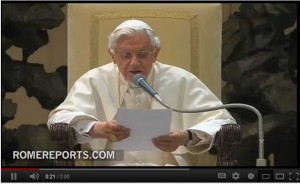
 – Benedict XVI today resumed his general audiences in the Vatican, having held them at Castelgandolfo during the month of August. Meeting with faithful in the Paul VI Hall he turned his attention to prayer in the Book of Revelation which, he explained, “presents us with the living breathing prayer of the Christian assembly, gathered together ‘on the Lord’s day'”.Revelation, Pope Benedict went on, “is a difficult book, but one of great richness. … In it a reader presents the assembly with a message entrusted by God to John the Evangelist. … From the dialogue between them a symphony of prayer arises which is then developed in many different forms up until the conclusion”.The first part of Revelation presents us with the assembly in prayer in three successive phases. The first of these highlights how “prayer is, above all, a listening to God Who speaks. Engulfed as we are by so many words we are little used to listening, and especially to adopting an interior and exterior attitude of silence so as to attend to what the Lord wishes to say to us. These verses also teach us that our prayers, often merely prayers of request, must in fact be first and foremost prayers of praise to God for His love, for the gift of Jesus Christ which brought us strength, hope and salvation. … God, Who reveals Himself as the beginning and the end of the story, welcomes and takes to heart the assembly’s request”.This first phase also includes another important element. “Constant prayer revives in us a sense of the Lord’s presence in our life and history. His presence supports us, guides us and gives us great hope. … Prayer, even that pronounced in the most extreme solitude, is never a form of isolation and it is never sterile, it is a vital lymph which nourishes an increasingly committed and coherent Christian existence”.In the second phase of the prayer of the assembly “the relationship with Jesus Christ is developed further. The Lord makes Himself visible, He speaks and acts, and the community, increasingly close to Him, listens, reacts and accepts”.In the third phase “the Church in prayer, accepting the word of the Lord, is transformed. … The assembly listens to the message, and receives a stimulus for repentance, conversion, perseverance, growth in love and guidance for the journey”.“The Revelation”, Benedict XVI concluded, “presents us with a community gathered in prayer, because it is in prayer that we gain an increasing awareness of Jesus’ presence with us and within us. The more and the better we prayer with constancy and intensity, the more we are assimilated to Him, and the more He enters into our lives to guide them and give them joy and peace. And the more we know, love and follow Jesus, the more we feel the need to dwell in prayer with Him, receiving serenity, hope and strength for our lives”.
[powerpress = Â Vatican_Radio]
Tags: book of revelation, pope benedict xvi
This entry was posted on Wednesday, September 5th, 2012 at 5:26 pm
You can follow any responses to this entry through the RSS 2.0 feed.

